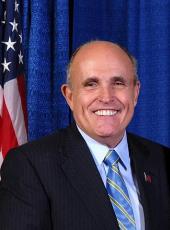
Giuliani Campaign Press Release - Rudy Rewind: Big Apple Success Story, Giuliani Brought Pro-Growth Policies To Liberal New York
Today, the Club for Growth released its fourth presidential white paper on former New York City Mayor Rudy Giuliani's economic record.
In New York City, Rudy Giuliani governed a locality dominated by liberal Democrats; public-sector labor unions; social-welfare activists; and a powerful local news media actively hostile to a limited-government philosophy. In the face of such tremendous headwind, Giuliani's economic accomplishments are remarkable.
Elected in 1993, on the heels of the largest annual tax increase in the city's history, Giuliani inherited a city crippled by high taxes, ballooning deficits, and stalled job growth. Despite these obstacles, Mayor Giuliani wasted no time in calling for $1 billion in tax cuts over the next four years, slashing city jobs, and cutting city-funded spending in real terms by more than $340 million.
[C]ity spending during Giuliani's eight years increased just barely, by an average of 2.84 percent — a remarkable number given the 2.9 percent population-plus-inflation benchmark. In addition, city spending as a percentage of GCP (gross city product) decreased from 10.9 percent to 9.3 percent — meaning, the size of government as a percentage of the economy actually decreased under Giuliani's tenure.
[G]iuliani's record on taxes and spending displays an intuitive appreciation for the vital role tax cuts play in growing the economy and a determination to cut the fat out of government. It is important to remember that Gotham's economic revival was due, in large part, to Giuliani's determination to stimulate a stagnant economy by cutting taxes and spending, even in the face of fierce opposition.
Giuliani demonstrated the same steely resolve and free-market mindset when it came to taking on New York City's welfare rolls and overbloated bureaucracy, and fighting for school choice.
In fact, welfare recipients under Giuliani's administration dropped from 1.1 million in 1994 to under 500,000 in 2001 — the lowest level in 35 years and a drop of more than 50 percent.
When it came to removing government's heavy handprint from the private sector, Giuliani was just as merciless, privatizing many elements of New York City's bulky bureaucracy. … He sold many entities he felt the city had no business owning — why in the world did New York City own off-track betting facilities? — and turned over thousands of city-owned properties to private owners and developers.
And though Giuliani began his mayoral career opposed to school choice, he soon became a passionate advocate for competition in the education market. Though he was ultimately unsuccessful in forcing even a pilot school vouchers program on his liberal city council and education board, he certainly deserves credit for trying.
The most important question is what Giuliani's mayoral tenure tells us about how he would govern if elected president. … [O]ne cannot help but conclude that if Giuliani could accomplish the pro-growth record he did in the hostile environment of New York City, the potential for him to accomplish even more amid the more politically balanced federal government is great.
To read the entire article, please click here.
Rudy Giuliani, Giuliani Campaign Press Release - Rudy Rewind: Big Apple Success Story, Giuliani Brought Pro-Growth Policies To Liberal New York Online by Gerhard Peters and John T. Woolley, The American Presidency Project https://www.presidency.ucsb.edu/node/294868
